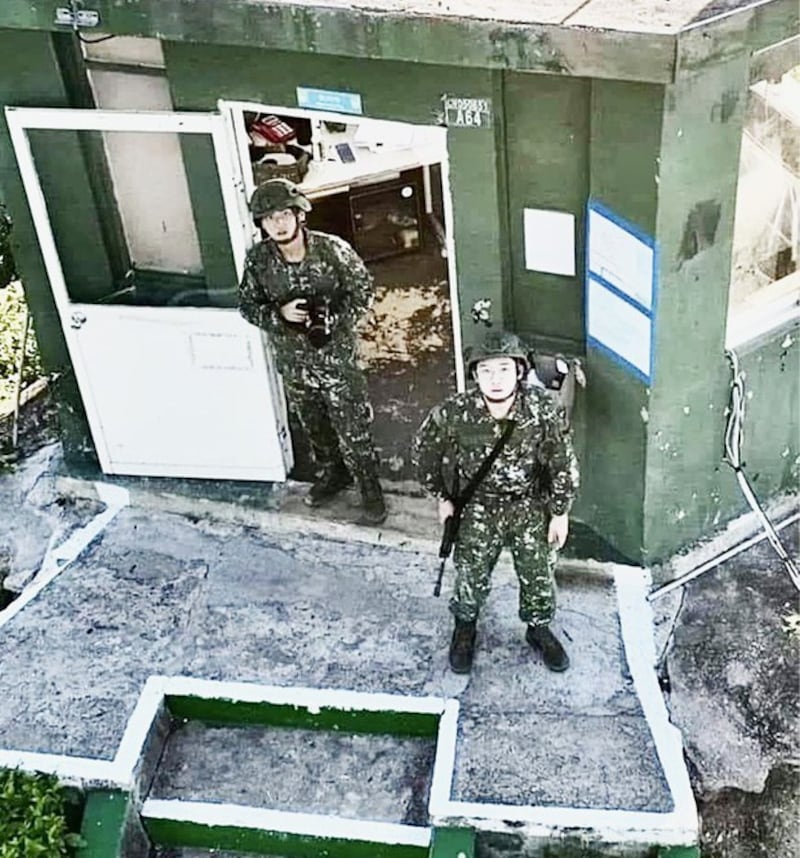Updated at 03:33 a.m. E.T. on 8-25-22
Taiwan’s Ministry of National Defense “will install a drone defense system next year” after a “humiliating” video showing Taiwanese soldiers throwing rocks at a hovering drone in Kinmen County emerged on Chinese social media, the ministry said late Wednesday.
In the short video, apparently shot by a civilian drone on Aug. 16 and recently posted on the Weibo microblogging website, two soldiers wearing masks were seen throwing rocks at the Chinese drone when it was flying above a Taiwanese military post.
The same drone also took a picture of two other soldiers staring at it from their watch room, one holding a camera. They looked both startled and curious.
The Kinmen Defense Command, which is responsible for the outlying islands of Kinmen, confirmed on Wednesday that the incident happened on Erdan, an islet 7 kilometers (4.3 miles) from Kinmen island but under 6 kilometers (3.7 miles) from the coast of China’s Xiamen island.
Kinmen is one of Taiwan’s far outlying islands, located much closer to China’s mainland than to Taiwan’s main island.
‘Humiliating video’
The photo and video went viral on Weibo and Chinese social media users didn’t waste time making fun of it.
One user, Zhao DaShuai, wrote on Twitter: “As you can see, the air defense in Taiwan was indeed active.”
“Taiwan’s most advanced surface-to-air weapon exposed,” another user chimed in.
Soon the drone’s visuals were picked up in Taiwan, with Taiwanese netizens calling it “humiliating” and “inexcusable.”

“Such a drone incident never happened before in Kinmen,” said Timothy Tsai, who was born on the island and heads a local military history group.
“It looks threatening to the island’s security,” Tsai said, adding that the military “should really look to strengthen the drone prevention and control” on outlying islands.
China deployed drones over Taiwan before as part of the week-long military drills held in response to U.S. House Speaker Nancy Pelosi’s visit to the island.
On Aug. 5, four Chinese drones were spotted flying over Kinmen but were warned off before they could enter the island’s airspace, the defense ministry said.
This time, the non-military drone got just a stone’s throw away, literally.
Wang Ting-yu, a lawmaker of Taiwan's ruling Democratic Progressive Party, was quoted by Reuters as describing the incident as "very serious."
"The drone was flying on top of our soldiers on guard but there's zero response," Wang was quoted as saying.
Priority given to outer islands
In its latest statement, the Taiwanese defense ministry said while setting up a national drone defense system in 2023, priority will be given to outer islands to help them deal with “gray zone threats.”
Gray zone activities are generally not explicit acts of war but harmful to the security of a nation.
Beijing regards Taiwan, a self-governing island located about 100 miles (160 kilometers) off the mainland, as part of China.
There are concerns that some outlying islands under Taipei’s control, including Kinmen, Penghu and Matsu, could be the first targets of China’s future attacks.
The statement from the defense ministry said the drone defense system will be remote-controlled. Soldiers and officers while operating it “will continue to follow the principle of 'not to provoke conflicts and not to cause disputes' and will use technological equipment to take appropriate countermeasures.”
On Thursday, Taiwan's government proposed U.S. $19 billion in defense spending for next year, a near 14% increase on this year's budget to a record U.S. $19.41 billion.
It was reported in May that Taiwan’s defense ministry approved a U.S. $146 million budget to buy indigenous drone defense systems designed by the National Chung Shan Institute of Science & Technology (NCSIST).
The systems would be installed at 45 military bases across Taiwan, including on outlying islands, to disrupt and neutralize hostile drones.
Taiwanese media reported that a local manufacturer of unmanned aerial vehicles (UAV) has delivered 800 combat drones, dubbed “flying mortars,” to Ukraine.
This story has been updated to include Taiwan's announcement of next year's proposed defense budget.
